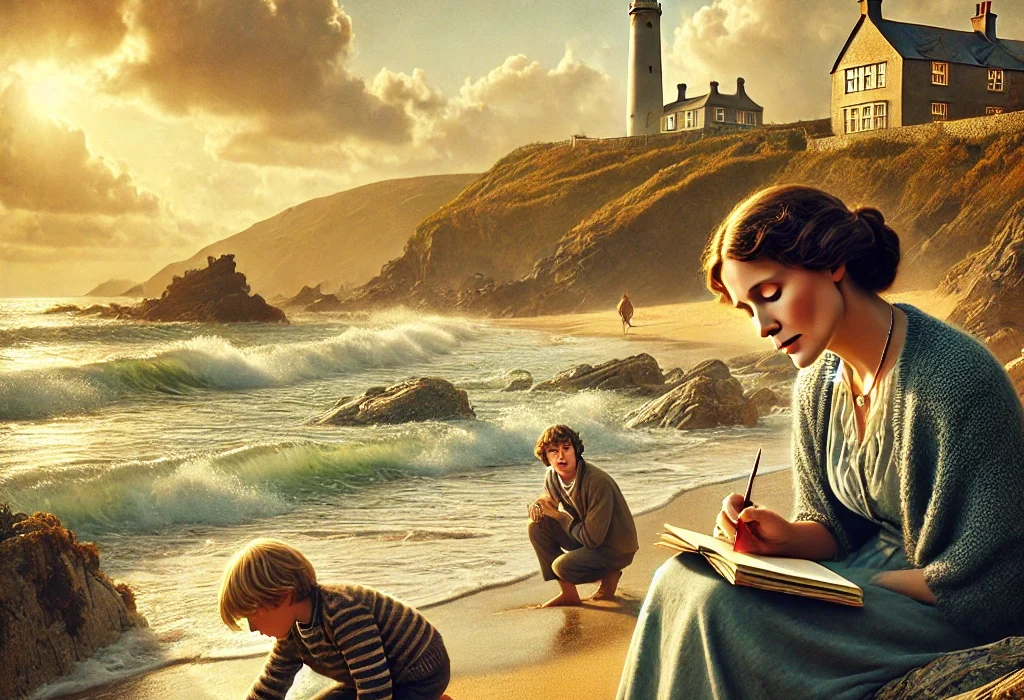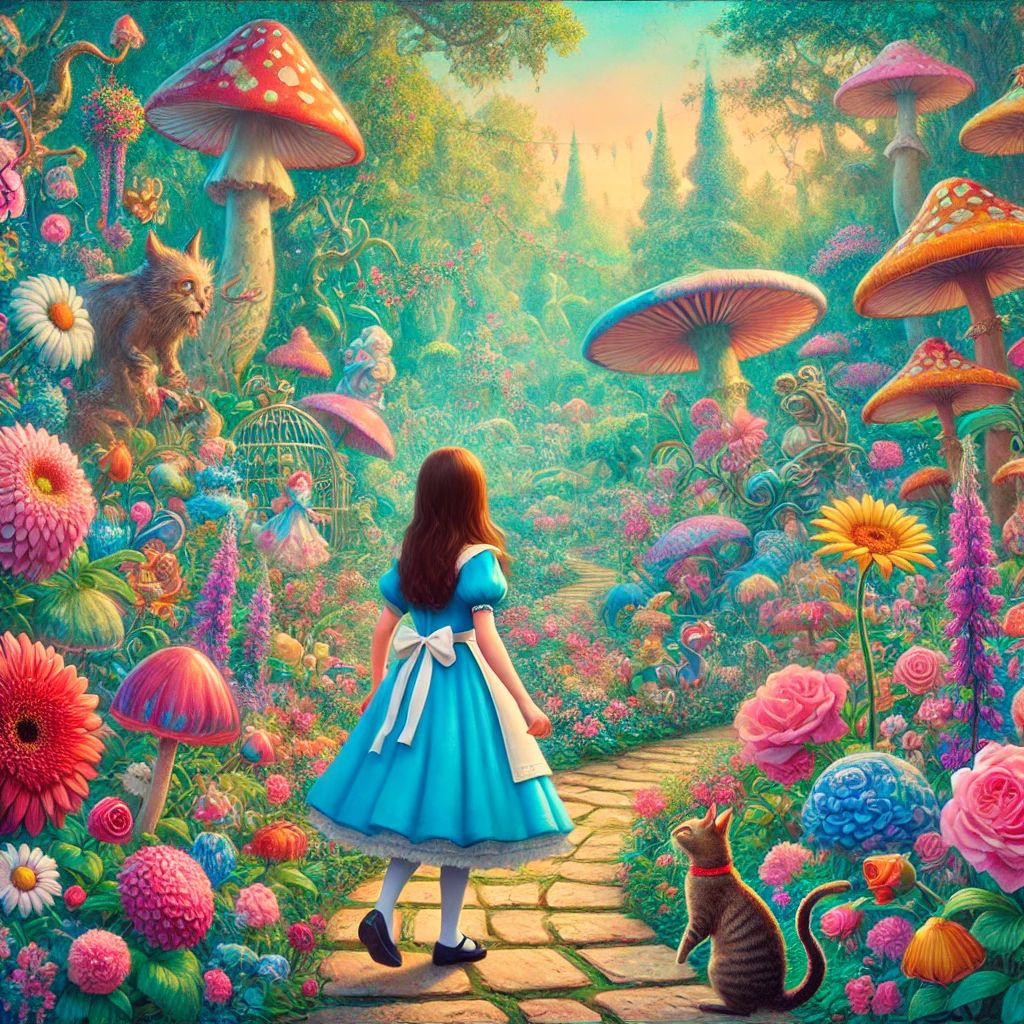“Jacob’s Room” by Virginia Woolf, published in 1922, is a modernist novel that explores the life and experiences of Jacob Flanders from childhood to adulthood. Set against the backdrop of early 20th-century England, the novel delves into themes of identity, memory, and the passage of time. Woolf employs a stream-of-consciousness narrative style, creating a rich, multi-layered portrait of Jacob’s life through the perspectives of those around him.
Comprehensive Plot Summary
On a windswept Cornish beach, Betty Flanders sits, her heels pressed into the sand, a letter clutched in her hand. It is the third of September, and the summer sun is already losing its warmth. She glances out to the sea, where her youngest son, Jacob, has wandered off, his small figure against the expansive sky. His elder brother, Archer, shouts his name, but the boy is lost in his own world, exploring the rocks, collecting small treasures the tide leaves behind. This beach, vast and timeless, is a place of solitude for them all. It reflects Betty’s own sense of being cast adrift, left to raise her children alone after the death of her husband, Seabrook.
Jacob grows into a thoughtful and curious child, one who finds more comfort in the company of the sea and the creatures that inhabit it than in the conventional life that surrounds him. He spends hours alone, engrossed in the play of light on the water or the slow crawl of a crab. His mother’s concern is like the ebbing tide—constant but unable to contain him. Jacob’s world is vast, his imagination unconstrained by the ordinary confines of his upbringing in a small seaside town.
As Jacob matures, he is sent to school, a place where the structure and order of learning conflict with his natural inclination for freedom. Yet, he excels, his intellect shining brightly even as he remains somewhat distant, an enigma to his peers and teachers. His education takes him to Cambridge, where the world opens up in new ways. He is absorbed by the ancient halls, the history that seems to seep from every stone. The city pulses with life, and Jacob dives into it, his days filled with lectures and his nights with the philosophical debates of youth.
In Cambridge, Jacob forms connections that shape him in subtle ways. There is Timmy Durrant, his friend and companion, whose energy and openness contrast with Jacob’s introspective nature. Through Timmy, Jacob meets Clara Durrant, Timmy’s sister, who watches Jacob with a quiet intensity. She is drawn to him, sensing the depths beneath his composed exterior, but Jacob remains elusive. Their interactions are a dance of near-misses and unspoken emotions, each leaving Clara with a mixture of hope and despair.
London calls to Jacob, and he moves to the city, immersing himself in its dizzying array of experiences. He frequents the British Museum, loses himself in the streets, and mingles with artists and writers. His encounters with women are many, yet he remains unanchored, a soul seeking something that eludes him. There is Florinda, a woman of vibrant spirit, whose carefree nature draws Jacob into a whirlwind romance. Their relationship is marked by passion and fleeting moments of connection, but it is clear that Jacob’s heart is not easily captured.
Amidst the city’s clamor, Jacob’s thoughts often drift back to the sea, to the quiet shores of his childhood. He feels the pull of distant lands and ancient civilizations, and soon, he sets off to travel across Europe. In Paris, he walks the same streets as the great thinkers and artists, absorbing the culture and history that seem to permeate the very air. In Italy, he is moved by the remnants of the Roman Empire, the ruins speaking to him of time’s relentless march and the impermanence of human achievement.
But it is in Greece that Jacob finds a kind of spiritual kinship. The ruins of Athens, the Parthenon standing against the sky, stir something deep within him. He contemplates the lives of those who walked these paths thousands of years ago, their struggles, their joys, their pursuit of knowledge. The ancient stones speak to him of the continuity of human existence, the way each generation builds upon the ruins of the last. Yet, even here, amidst the beauty and history, Jacob feels the weight of something ungraspable, an essence of life that remains just beyond his reach.
Back in England, the world is changing. The rumblings of war grow louder, and the shadow of conflict looms over Europe. Jacob returns home, now a man, yet still searching for meaning in a world that seems increasingly chaotic. The war breaks out, and like many of his generation, Jacob is drawn into its orbit. He enlists, not with a sense of patriotic fervor, but as if compelled by an invisible force, a need to find purpose in a time of uncertainty.
His letters from the front are sparse, filled with observations of the mundane and the horrific. He writes of the camaraderie among the soldiers, the endless waiting, and the sudden, violent bursts of action. His words convey a sense of detachment, as if he is observing life from a distance, even as he stands on the precipice of death. The Jacob that emerges in these letters is a man caught between worlds—the intellectual and the visceral, the past and the present, life and death.
And then, silence. Jacob is reported missing, his fate unknown. Back in England, his room stands as he left it, a silent testament to a life both ordinary and extraordinary. His mother, Betty, keeps it as a shrine, filled with the books he loved, the clothes he wore, the small artifacts of his existence. Friends and acquaintances remember him in fragments, their memories piecing together the image of a man who was always just out of reach, whose essence seemed to slip through their fingers even as they tried to grasp it.
In the end, Jacob’s presence is felt most acutely in his absence. He is a figure shaped by the perspectives of others, a man whose inner life remains largely unknowable, even to those closest to him. His journey, from the rocky shores of Cornwall to the battlefields of Europe, is one of seeking—a search for identity, for meaning, for a place in the vast tapestry of existence. And though his life is cut short, the questions he grapples with, the moments of connection and disconnection, linger on, echoing through the lives of those he touched.
Jacob’s room, with its lingering scent of tobacco and the faint traces of his handwriting on scattered papers, becomes a symbol of the ephemeral nature of life. It stands as a reminder of the fleeting nature of human existence, the way we move through the world leaving only the faintest of imprints. In the quiet aftermath of his passing, as the world shifts and changes, the memory of Jacob Flanders endures, a testament to the enduring human spirit and the unending quest to understand the self in a world that is always in flux.
Main Characters
- Jacob Flanders: The protagonist, whose life from childhood to adulthood is explored through the eyes of others. Jacob is intellectual, introspective, and enigmatic, embodying the modernist themes of identity and memory.
- Betty Flanders: Jacob’s mother, a widow who struggles with raising her children alone. She is protective and loving but often distant, reflecting the challenges of single parenthood.
- Clara Durrant: A sensitive and thoughtful young woman deeply infatuated with Jacob. Her unfulfilled love for Jacob highlights the novel’s exploration of relationships and emotional complexity.
- Florinda: A vibrant and free-spirited woman who represents the passionate side of Jacob’s romantic life. Her relationship with Jacob contrasts with his more intellectual and emotional connections.
Themes and Motifs
- Identity and Self-Discovery: The novel explores Jacob’s search for identity and meaning in a rapidly changing world. His intellectual pursuits and relationships reflect his quest for self-understanding.
- Memory and Time: Woolf’s fragmented narrative structure emphasizes the fluidity of memory and the passage of time. The novel’s shifting perspectives and temporal leaps highlight the transient nature of human existence.
- War and Loss: The impact of World War I is a poignant theme in the novel. Jacob’s disappearance in the war underscores the devastating effects of conflict on individuals and society.
- Nature and Solitude: Jacob’s connection to nature and his moments of solitude are recurring motifs. These elements reflect his introspective nature and his search for peace and understanding.
Writing Style and Tone
Virginia Woolf’s writing style in “Jacob’s Room” is characterized by its stream-of-consciousness narrative, which allows for deep introspection and a rich exploration of characters’ inner lives. Her use of fragmented and poetic language creates a tapestry of thoughts and emotions that convey the complexity of human experience. Woolf’s tone is reflective and often melancholic, capturing the ephemeral and transient nature of life. The novel’s innovative narrative techniques and lyrical prose contribute to its status as a seminal work of modernist literature.
We hope that this summary has sparked your interest and would appreciate you subscribing to our newsletter.
There’s a treasure trove of other fascinating book summaries waiting for you. Check out our collection of stories that inspire, thrill, and provoke thought, just like this one by clicking here.
Remember, while our summaries capture the essence, they can never replace the full experience of reading the book. If this summary intrigued you, consider diving into the complete story – buy the book and immerse yourself in the author’s original work.
If you want to request a book summary, click here.
When Saurabh is not working/watching movies/reading books/traveling, you can reach him via Twitter/X, or LinkedIn.
Restart reading!






